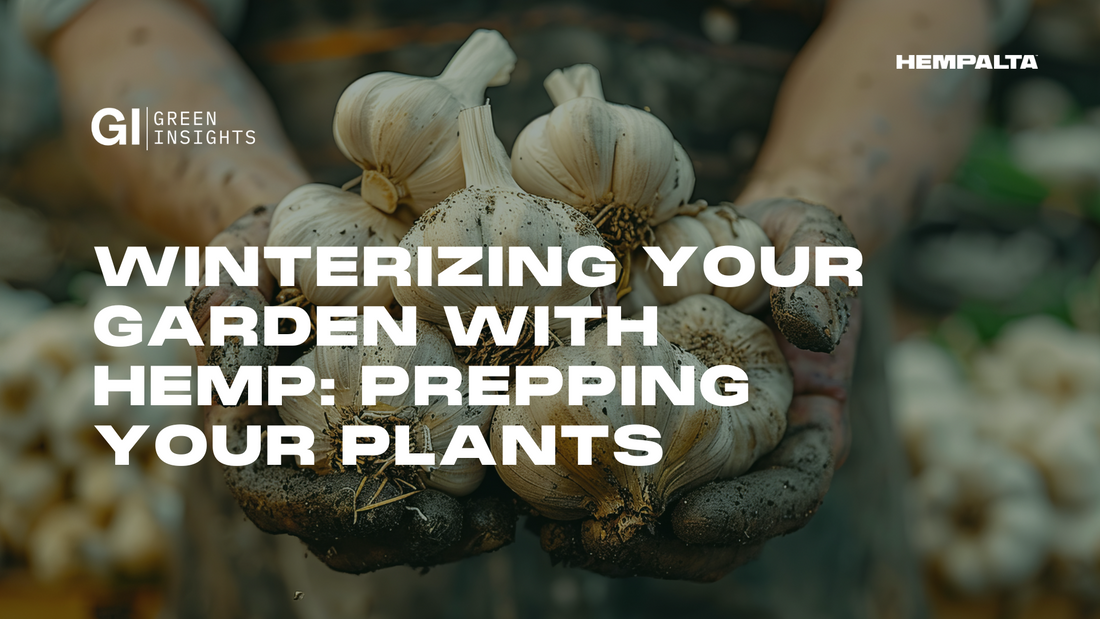
Winterizing your Garden with Hemp: Prepping your Plants
Share
As winter approaches, it’s time to prepare your garden for the colder months ahead. Whether you’re a seasoned gardener or new to the practice, taking the right steps now will ensure that your soil and plants are well-protected and ready to thrive when spring arrives. Winterizing your garden is essential to maintaining the health of your plants and soil, and hemp can play a significant role in this process.
Here are some key tips to help you winterize your garden effectively:
Clean out your garden.
The first step to prepping your garden is a thorough cleanup. Begin by removing all weeds and debris from your garden beds. This not only clears the area but also eliminates potential insect eggs, diseases, and unwanted plant growth that could cause issues in the spring.
Additionally, removing any plants that have completed their life cycle will remove any harboring pests or disease that could be spread to new plants. Dispose of all debris properly, either by composting or through municipal yard waste programs, to ensure that your garden is left clean and ready for the next steps.

Know which plants to grow in the Fall.
Fall is not just about winding down your gardening activities; for many it is also an excellent time to plant certain crops. Knowing which plants thrive in cooler temperatures can add a new dimension of excitement to your gardening experience. Some plants that can be successfully grown or planted in the fall include.
- Garlic: planting garlic in the fall allows for more established roots, leading to a robust harvest in late spring-early summer.
- Onions: like garlic, onions can be planted in the fall to get a head start on the growing season.
- Spinach: This cold-hardy green can be sown in the fall and will often survive under the snow, providing an early harvest in spring.
- Perennial Herbs: Many perennial herbs, like thyme and sage, can be planted in the fall to establish strong root systems over winter.
For first-time gardeners, experimenting with fall planting can be an enjoyable and rewarding experience, offering a fresh perspective on seasonal gardening.
Adding compost.
To prepare your soil for winter and the next growing season, adding compost can be a great option. Compost enriches the soil with essential nutrients, supports plant health, and improves soil structure. This process not only benefits your plants during the winter but also gives them a significant boost when the warmer weather returns.
Not sure what to compost with? Here are some great options:
- Kitchen scraps: Fruit and vegetable peals, cores, skins, coffee grounds, filters, teabags, eggshells, and even old herbs and spices.
- Animal products: Manure, fur, and feathers can add rich nutrients to the soil.
- Yard waste: Grass clippings, leaves, weeds, and dead plants make excellent compost material, contributing organic matter to the soil.

PRO-TIP: Biochar is a long-lasting soil amendment that improves water retention, enhances nutrient availability, and increases microbial activity. By combining biochar with compost, you create a highly nutritious, well-aerated environment for your plants to thrive.
To prepare the biochar, pre-charge the biochar first by mixing it with compost or compost tea. This ensures that the biochar doesn’t absorb nutrients from the soil. Aim for a mixture ratio of 50% biochar and 50% compost to charge the biochar with essential nutrients. Next, apply the biochar-infused compost to your garden beds.
To learn more about our Biochar, click this link: https://www.hempalta.com/products/biochar
Planting your fall bulbs.
Once your soil is prepped and enriched with compost, it’s time to plant your fall bulbs. Fall is the perfect season to transplant overgrown shrubs and introduce new one that can enhance your garden’s aesthetic. Planting bulbs like tulips, daffodils, and hyacinths in the fall ensures they will bloom beautifully in the spring.
When planting, make sure to follow proper spacing guideline to avoid overcrowding, and consider the height and spread of the mature plants to achieve the desired garden design.
For more information on which plants benefit from mulching, keep an eye out for our upcoming article!
 Apply Hemp Mulch.
Apply Hemp Mulch.
Mulching is a critical step in protecting your garden from the harsh winter elements. Applying a layer of hemp mulch, such as HEMPALTA’s Premium Long Fiber Garden Mulch, offers numerous benefits. Our mulch acts as a protective blanket for your soil, safeguarding it from wind, foot traffic, and excess moisture from snowfall. It also helps retain soil moisture, which is crucial during the dry winter months.
While not all plants require mulching, tender bulbs, newly planted shrubs, and young trees can greatly benefit from the added layer of protection that hemp mulch provides.
To learn more about our garden mulch, click this link: https://www.hempalta.com/products/hemp-mulch

Protect your plants when expecting heavy snowfall.
In regions prone to heavy snowfall, additional protection for your plants is necessary. After applying mulch, consider covering delicate plants with burlap, canvas, or old sheets. This extra layer of protection can prevent damage from the weight of snow and reduce the impact of extreme cold temperatures.
To properly cover your plants, create a support structure around them, such as stakes or a small frame, to keep the covering material from directly touching the plants, which cause damage.
By following these six steps, you can ensure that your garden is well-prepared to withstand winter’s challenges. Winterizing your garden with hemp not only protects your plants during the colder months but also enriches your soil, setting the stage for a healthier, more vibrant garden come spring. Embrace the winter season as an opportunity to care for your garden, and you’ll be rewarded with a flourishing landscape when the warmth returns.



